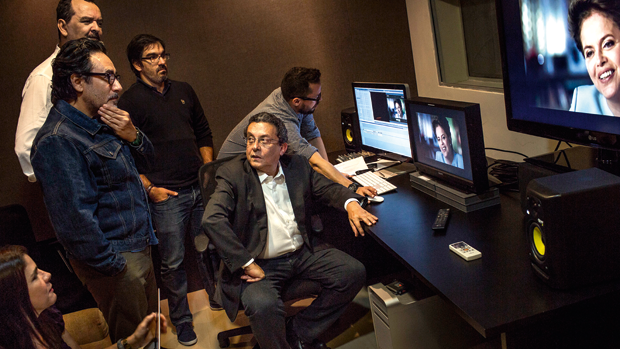PT tries to bulldoze Marina Silva but she resists
The Workers Party is terrified at the prospect of losing power and has adopted the tactic of attacking Marina Silva at any cost. The result is a campaign that has never been seen before in Brazil

The decision by the Worker´s Party (PT) to bulldoze Marina Silva was taken at a dinner held in the Unique Hotel in São Paulo on September 1 shortly after the second debate between the presidential candidates shown on the SBT television channel. Around the table were the Brazilian president, Dilma Rousseff, who is the party´s candidate, former president Lula, marketing strategist João Santana, former minister Franklin Martins, current minister, Aloizio Mercadante, and the PT chairman, Rui Falcão. They came to the consensus that the Silva phenomenon was much more sustainable than it looked in principle. If nothing was done, they concluded that Silva would be occupying the presidential chair for the following four years. “The surveys showed this. We had no alternative but to launch a strong attack,” a government minister told VEJA. At that time, Silva, who is standing for the Brazilian Socialist Party (PSB), and Rousseff seemed to be heading for a draw in the first round of voting and Silva was 10 points ahead in the second round. Lula summed up the prevailing feeling and gave the marching order: “We need to react and reorganize the troops”.
As always in cases like this, with a well-oiled team ready that has worked together on many campaigns and knows the ethical limits, or lack of them, there was no need to spell out what needed to be done. The very diagnosis of the problem contained its solution. Silva had become a sacred object, a combination of the spirit of the forest and the spirit of capitalism, half Chico Mendes, half Steve Jobs. It was decided that the destruction of her candidature would be euphemistically called “deconsecration”, i.e. divesting her of her sacred qualities or status.

THE MAGICIAN – João Santana (seated) from Bahia state is a legend in political marketing and has already made six presidents, including Lula and Rousseff
The PT machine propaganda, commanded by the veteran bemedalled publicity strategist Santana, quickly swung into action and showed its power. In less than a week the results started to appear in Rousseff´s electoral program and television and radio spots. Such a violent combination of lies, falsification, manipulation, exaggeration and untruthful accusations as those dumped by the PT on Silva has never been seen in Brazil´s electoral history. Rousseff´s electoral campaign put aside any scruples, forgot the debate on ideas and proposals, and ignored the most basic decencies that ensure political adversaries get along together in a civilized way. From then on, Silva was smeared in the ignominious, shameful way the party had already used against all those who had dared to come between the PT and power. The PT campaign language against Silva adopted the desanctifying methods echoed in the thought eradication campaigns of Mao Tse-tung´s Cultural Revolution.
In Rousseff´s program, Silva was shown not as a candidate without very clear proposals, which were therefore difficult to evaluate and refute, but as an annihilating and inhuman force. It was not that the Silva´s economic proposals were described as inadequate for Brazil or even good but impractical. This would be praise. The PT campaign claimed her economic policy would lead the poor to starve. It produced one short film in which plates of food disappeared magically from the table in front of the eyes of starved people. In another caricature film, actors play the role of sinister bankers and capitalists, shown as Silva´s friends, conspiring to carry out bad deeds against the people. Silva was accused of planning to end the pre-salt oil reserves and remove R$ 1.3 trillion in revenues from the oil destined for education.
She was compared to Jânio Quadros, the crazy former president who planned to invade French Guiana, and resigned, in a silly attempt to obtain dictatorial powers over Congress, throwing the country into a deep crisis, reflexes of which are felt to this day. The PT members insinuated that she was also like former president Fernando Collor but Lula ordered this part to be cut. Collor was impeached by Congress for corruption but is now totally identified with Lula´s way of running the PT. Lula and Collar now go hand in fist.

THE AMATEUR – Diego Brandy (in glasses) was parachuted into Silva´s campaign. He is a specialist in analyzing polls, not in electoral propaganda
Silva´s side has none of the structure or experience of Santana´s machine, that has already helped elect six presidents in Brazil and abroad. Her team was so paralyzed and astonished by the attacks that it even seemed to be adopting the “passive resistance,” approach of Mahatma Gandhi and other prophets of nonviolence. The sociologist Diego Brandy, who is in charge of Silva´s propaganda, was parachuted into political marketing. Money is so tight that the campaign videos, which only have a paltry one minute and 49 seconds of television time, do not even pass through the obligatory qualitative surveys. “You can´t compare it with the PT campaign,” said one of the campaign leaders who likened it to comparing an amateur football team from the back of beyond with Barcelona.
Meanwhile, the first encouraging results of the offensive started to appear in the Rousseff bunker. Surveys of small groups attributed the success to one video that said “Being against the pre-salt layers is like being against the future of Brazil”. This was the reason why Rousseff overtook Silva in Rio de Janeiro, an oil-producing state and the third-largest electoral college in the country. This was followed by two other films with the same origin and inspiration. The first claimed that Silva´s proposal to grant independence to the Brazilian Central Bank would give an disproportionate power to bankers while the screen showed a family watching the food disappearing from their plates. The second video said that Silva would take money away from education. Once again children in the video saw the letters from the pages of their books disappear. The crudeness of the message, not to say its dishonesty, was aimed at targeting one of the main fears of the emerging C class – the loss of its recently-won purchasing power.
The heavy artillery will continue. A new “menu of dishonor” is already being drawn up to expand Rousseff´s advantage in the Northeast. The PT intends claiming that Silva will run down the public banks, such as Caixa Econômica Federal, thereby affecting the “My House, My Life” social housing program. Another upcoming claim is that if Silva is elected, she will put companies out of business and overturn investments and jobs. The pretext for this attack is a phrase by Eduardo Giannetti, Silva´s economic advisor, who said in an interview: “I think industry should be prepared to start growing up on its own again. It is used to crying and being looked after”. In fact, Giannetti was saying the same as Armínio Fraga — the star name in PSDB candidate Aécio Neves´s economic team. Fraga said the Brazilian economy was in intensive care “and needs to be gradually brought back to breathe on its own without artificial equipment”. These are obvious statements that something needed to be done. Although Brazilian industry has been breastfed and kept in an artificial state of life with help from the government in Brasília, it is in ruins.
Silva will try and turn her weakness into a triumph and continues to repeat that she is the target of “two parties that have united” for a “David and Goliath battle”. She also felt hurt by the Neves criticism. Attacks such as those made by the PT against Silva are unprecedented in Brazil´s electoral history. A study by political scientist Felipe Borba from the University of Rio de Janeiro (Uerj) that analyzed the political propaganda in all the presidential elections from 1989 to 2010 showed that the candidate who is ahead uses an average of 3% of his or her TV time to attack adversaries. A survey made for VEJA, using the same criteria as Borba, showed that Rousseff has used 15% of her propaganda time since September 2 to attack Marina – five times the historic average of leaders in the dispute.
There were signs at the end of last week that Silva is swaying with the wind and showing a strong resistance to the deconsecration campaign. Mauro Paulino, director general of the Datafolha polling institute said: “It was the first time that Marina had been exposed to such intense attacks in the campaign. Despite this, she managed to remain at the same level, as her rating moved down within the margin of error”.



 SEGUIR
SEGUIR
 SEGUINDO
SEGUINDO

 Palmeiras x Vasco no Brasileirão: onde assistir, horário e escalações
Palmeiras x Vasco no Brasileirão: onde assistir, horário e escalações Otávio Augusto quebra o silêncio sobre desprezo a Grazi Massafera
Otávio Augusto quebra o silêncio sobre desprezo a Grazi Massafera Como ‘Casamento às Cegas’, da Netflix, virou caso de polícia
Como ‘Casamento às Cegas’, da Netflix, virou caso de polícia Internacional x Corinthians no Brasileirão: onde assistir, horário e escalações
Internacional x Corinthians no Brasileirão: onde assistir, horário e escalações Lula dá aval ao fim da obrigatoriedade de autoescola para tirar a CNH
Lula dá aval ao fim da obrigatoriedade de autoescola para tirar a CNH




